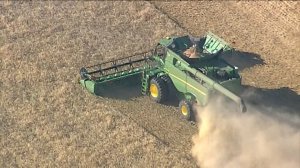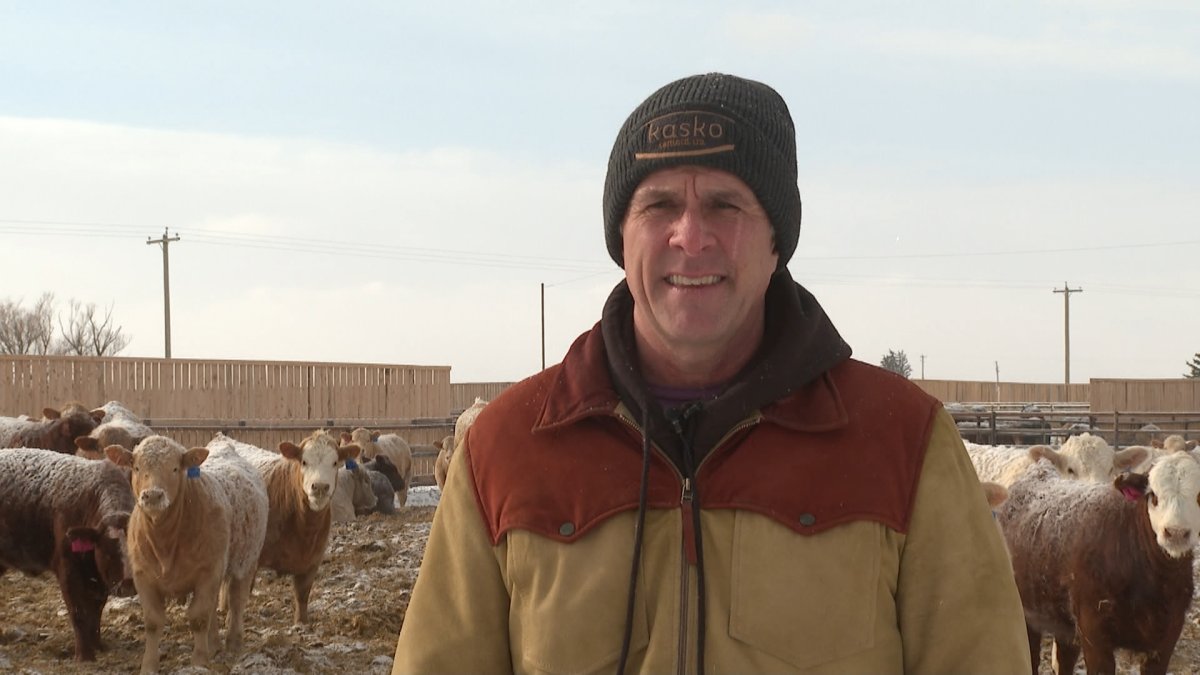Every day, rail cars full of wheat, barley and other the other grains rattle across train tracks connecting Canada and the United States, while semi trucks hauling cattle, pigs and other livestock criss-cross the border.
“One of the most significant agriculture trading relationships in the world.”
That’s how the Canadian Federation of Agriculture describes the amount of cross-border trade between Canada and the United States when it comes to agriculture and the agri-foods industry.
According to the Canadian government, in 2023, about $72.5 billion dollars worth of cattle, grains and other agriculture-related items flowed one way or another across the border.
Alberta alone exported $6.5 billion worth of goods and imported $2.3 billion, with many of those goods in turn used in the production of other products.
For Ryan Kasko, owner of Kasco cattle company, it’s ‘perplexing’ why the U.S. would want to start a trade war with Canada.
Global News
For Ryan Kasko, Owner of Kasko Cattle Company in Coaldale, it’s perplexing why the U.S. would want to start a trade war with Canada.
“This is one of these things that we just can’t expect, that our closest allies and neighbors would create a trade war with us over something like this,” said Kasko.
“I think all Canadians are feeling the same — like, why are we doing this — we’re supposed to be working together and solve our our challenges together with our neighbours.”
Kasko estimates a 25 per cent tariff on live cattle exported to the U.S. would amount to about $1,100 per head.
While most of his herd is processed and sold in Canada, about 40 per cent of that is shipped south, where it would also be subjected to a 25 per cent tariff.
His concerns about the future of Canada’s access to U.S. markets are echoed by Dave Bishop, regional director of Alberta Grains.
“We export an awful lot to the U.S. of wheat and barley and pulses and canola — and we always sell at the world market price. So where that’s going to be? I’m not sure,” said Bishop.
“Our crop inputs — fertilizer goes south, we get crop production products come north — the farm machinery, that’s another big one because parts go back and forth across the border multiple times to build a piece of equipment, so what are the tariffs are going to do?”
And buying Canadian, said Bishop, is often not possible.
“We have U.S. products up here that we can’t get Canadian-made. You have a lot of Canadian products that they can’t get made down there. It’s so integrated.”

In 2023, the province of Alberta alone exported an estimated $6.5 billion worth of products from the agriculture and agri-food industries to the United States.
Even as the deadline for implementing those threatened tariffs was pushed 30 days down the road on Monday afternoon — they’d been set to begin on Tuesday — it leaves the situation up in the air for several more weeks.
Bishop hopes the threat of tariffs is just a negotiating tactic, but adds,”it’s the fear of the unknown. Trump’s a bit of an unknown. Looking from the outside in, I think that’s what it looks like — it’s a negotiation tactic.”
To Bishop, the long term solution — and perhaps a silver lining to this “frustrating dispute” — is for Canadian producers to find other markets.
“What’s Trump going to do next? What are we going to do next? How far does this escalate? It could get really, really, really ugly,” added Bishop.
“We are going to need to continue to focus on other markets,” added Kasko.
“You know, we say this time and time again and it’s not that easy. The U.S. is a close ally. They’re next door neighbors and so it is a natural market for us. But we need to continue to seek other ways to market our cattle.”
At the same time, said Kasko, Canadians needs to let Trump know he can’t bully us.
“It’s difficult. You know, I think a lot of us feel that Trump expects someone to come back fighting — so I think the most important thing is that Canada as a whole has to work together — I don’t think we can just let Trump push us around.”

